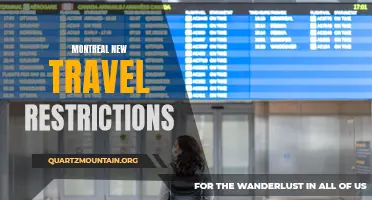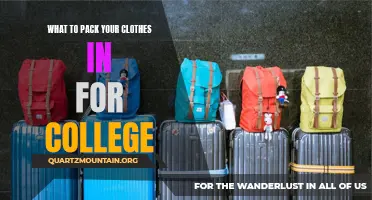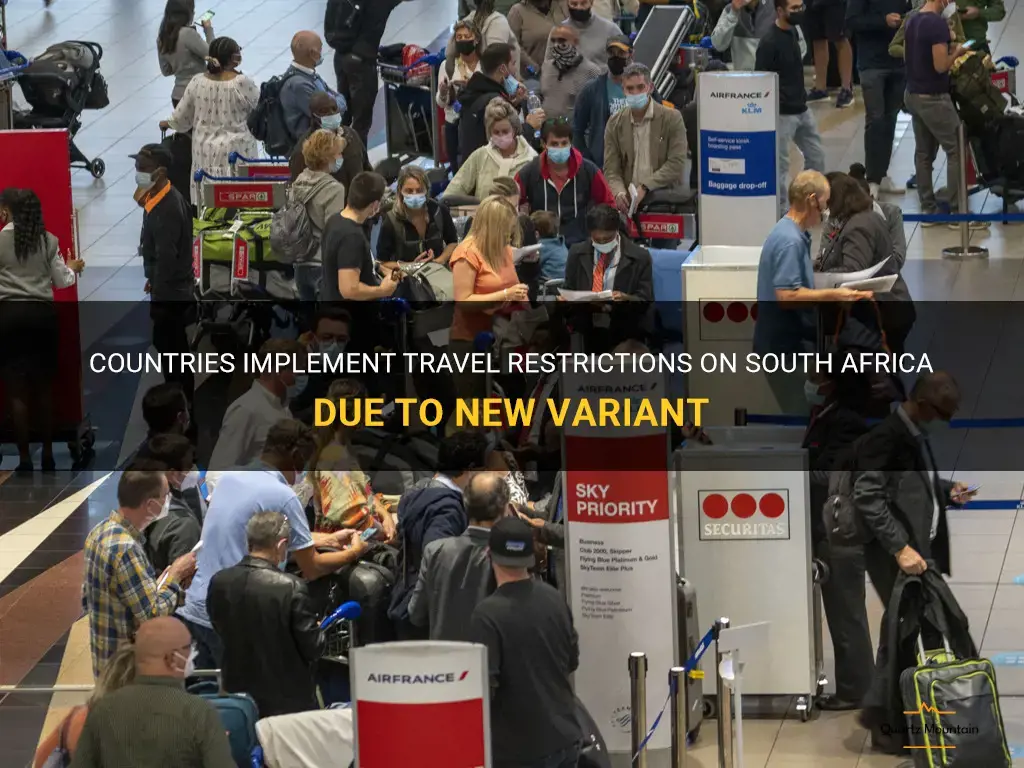
In an effort to contain the spread of a new COVID-19 variant, which was first detected in South Africa, countries around the world have been imposing travel restrictions on travelers from this country. These measures, while necessary, have sparked a debate on the effectiveness of travel bans and their impact on global connectivity. While the restrictions aim to safeguard public health, they also raise concerns about the potentially harmful effects on the economy, international relations, and the well-being of individuals who may be stranded away from their homes. This complex issue showcases the delicate balance between safeguarding public health and maintaining global interconnectedness in times of crisis.
What You'll Learn
- Which countries have recently announced restrictions on travel from South Africa?
- What is the rationale behind these countries' decisions to restrict travel from South Africa?
- Are the travel restrictions from South Africa limited to air travel only, or do they also apply to land and sea borders?
- How long are these travel restrictions expected to be in place?
- Are there any exceptions or exemptions to these travel restrictions for certain categories of travelers?

Which countries have recently announced restrictions on travel from South Africa?
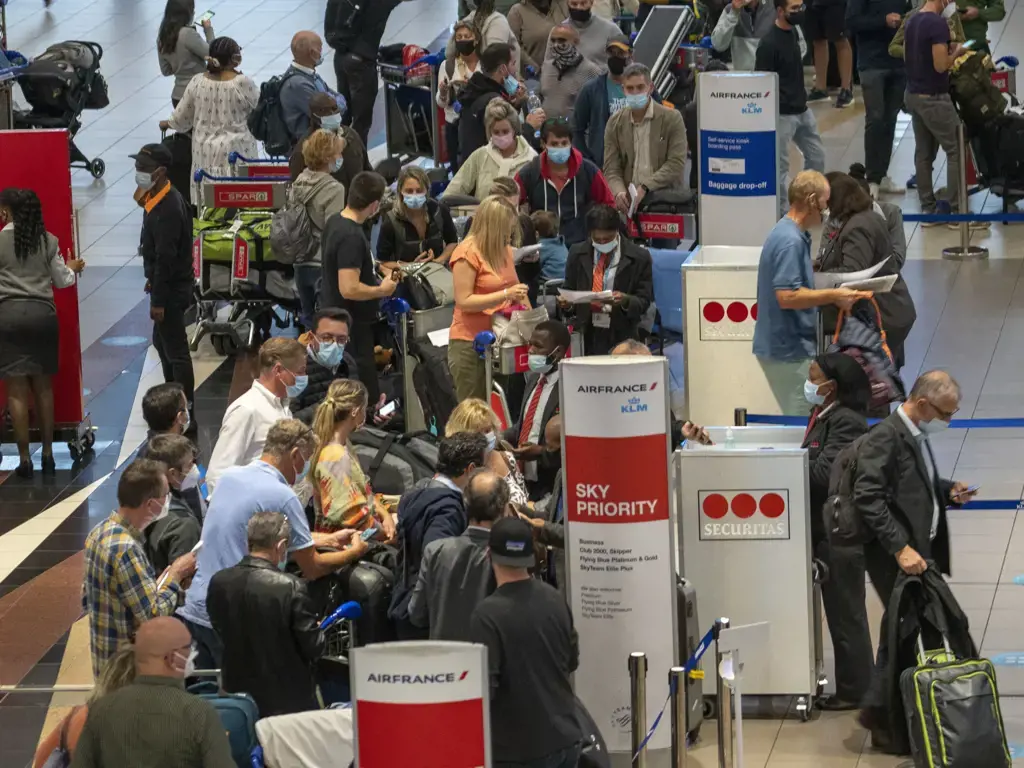
In response to the recent spike in COVID-19 cases in South Africa, many countries around the world have implemented restrictions on travel from the country. These restrictions aim to prevent the further spread of the Omicron variant, which was first identified in South Africa.
As of now, several countries have announced travel restrictions on travelers from South Africa. Some of these countries include:
- United Kingdom: The UK has imposed strict travel restrictions on South Africa. From 4 am on 26 November, all direct flights from South Africa to the UK were banned. British citizens and residents returning from South Africa are required to undergo mandatory quarantine and must take multiple COVID-19 tests.
- United States: The United States has also implemented travel restrictions on South Africa. Starting from 7 am on 27 November, non-US citizens or permanent residents who have been in South Africa within the past 14 days are not allowed to enter the US. Some exceptions apply, such as for US citizens, their spouses, and children.
- Germany: Germany has also imposed travel restrictions on South Africa. From 28 November, travelers from South Africa are subjected to mandatory quarantine and must present a negative COVID-19 test result prior to boarding the flight to Germany.
- France: France has suspended all flights from South Africa until further notice. French citizens and residents returning from South Africa are required to quarantine for at least seven days upon arrival.
- Netherlands: The Netherlands has suspended flights from South Africa until at least 8 December. Dutch citizens, residents, and people with essential reasons for travel are allowed to enter the country, but they must undergo a 10-day quarantine.
These are just a few examples of the countries that have implemented travel restrictions on South Africa. It is important to note that travel restrictions can change rapidly and vary from country to country. Therefore, it is advisable for travelers to stay updated with the latest information from their respective governments and airlines before planning any travel. Additionally, it is essential to follow all necessary precautions and protocols to prevent the spread of COVID-19.
Understanding the Latest Mauritius Travel Restrictions: What You Need to Know
You may want to see also

What is the rationale behind these countries' decisions to restrict travel from South Africa?
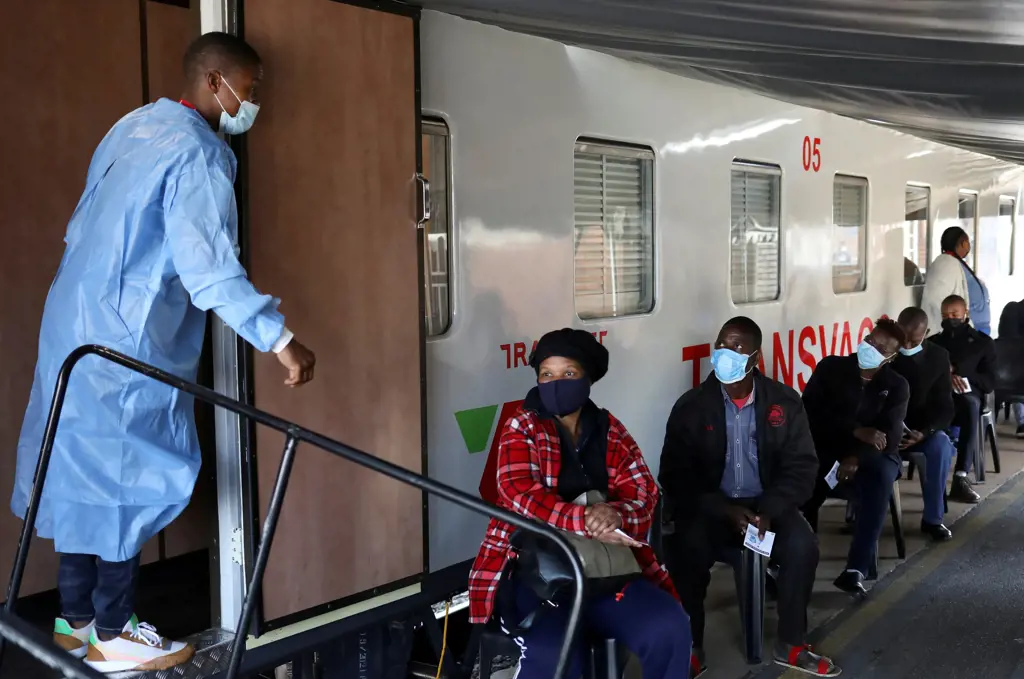
As the new Omicron variant of COVID-19 emerged in South Africa, several countries around the world swiftly imposed travel restrictions to and from the country. This decision was made based on the rationale of preventing the spread of the new variant within their own borders and mitigating the potential threat it poses.
One of the primary reasons for these travel restrictions is the uncertainty surrounding the Omicron variant. The variant was first identified in South Africa and was found to have a large number of mutations, including several in the spike protein, which is the target of many COVID-19 vaccines. This raised concerns that the variant might be more transmissible and could potentially evade the immunity provided by vaccination or prior infection. To prevent the importation of the variant, many countries decided to restrict travel from South Africa.
Additionally, the rapid spread of the Omicron variant within South Africa itself was another factor in the decision to impose travel restrictions. The variant was identified in several provinces in South Africa, leading to a sharp increase in cases. This suggested that the variant may be more contagious than previous variants, raising concerns that it could quickly spread to other countries if unrestricted travel continued. By imposing travel restrictions, countries aimed to slow down or halt the spread of the variant within their own borders.
Furthermore, the limited information available about the Omicron variant also played a role in the decision-making process. At the time of the travel restrictions, there was limited data on the severity of the illness caused by the variant and its potential impact on the efficacy of current vaccines. This lack of knowledge added to the level of uncertainty surrounding the variant and contributed to the cautious approach taken by many countries.
Another important rationale behind the travel restrictions was to buy time for countries to assess the situation and gather more information about the Omicron variant. By temporarily halting travel from South Africa, countries could implement additional public health measures, such as increased testing and contact tracing, to better understand the variant and its implications. This time was also crucial for scientists and researchers to study the variant, analyze its genetic makeup, and determine its potential impact on public health.
In conclusion, the rationale behind the decision to restrict travel from South Africa was primarily driven by the uncertainties surrounding the Omicron variant. Countries were concerned about the variant's potential increased transmissibility and ability to evade immunity. The rapid spread of the variant within South Africa and the limited information available further fueled these concerns. By imposing travel restrictions, countries aimed to prevent the importation and spread of the variant within their own borders, while buying time to gather more data and implement appropriate measures to control the situation.
Navigating Frankfurt's Travel Restrictions: What You Need to Know
You may want to see also

Are the travel restrictions from South Africa limited to air travel only, or do they also apply to land and sea borders?
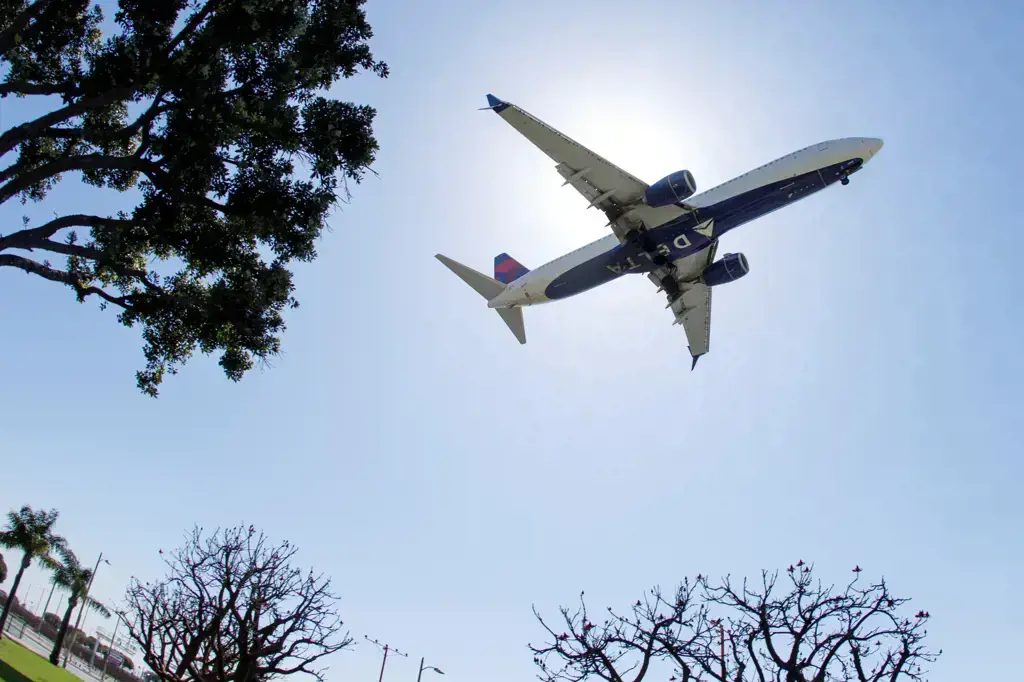
The travel restrictions implemented by many countries in response to the COVID-19 pandemic have greatly impacted international travel. South Africa, like many other countries, has also implemented travel restrictions to contain the spread of the virus. However, the restrictions imposed by South Africa are not limited to air travel only; they also apply to land and sea borders.
In March 2020, the South African government declared a state of disaster and implemented various measures to control the spread of COVID-19. These measures included restrictions on international travel, which affected all modes of transportation.
When it comes to land borders, South Africa has restricted entry and exit to neighboring countries. Only certain categories of people are allowed to enter or exit the country through land borders. These include South African citizens, permanent residents, diplomats, people with valid work permits, and individuals transporting goods. This restriction aims to prevent the importation of the virus from neighboring countries and to control the movement of people.
Similarly, for sea travel, South Africa has taken measures to limit entry and exit at its major ports. Passenger liners and cruise ships are prohibited from docking at South African ports, with exceptions made only for the disembarkation of South African citizens or permanent residents. This restriction applies to both international and domestic cruises.
The travel restrictions for all modes of transportation, including land and sea borders, are regularly updated by the South African government based on the prevailing COVID-19 situation. These restrictions are implemented in conjunction with screening procedures, mandatory quarantine measures, and testing requirements for those who are allowed to enter or exit the country.
It is important for travelers to check the latest travel advisories and regulations before planning any trip to or from South Africa. The South African Department of Home Affairs and the respective embassies or consulates can provide the most up-to-date information regarding travel restrictions and requirements.
In conclusion, South Africa has implemented travel restrictions that apply to all modes of transportation, including air, land, and sea borders. These restrictions aim to control the spread of COVID-19 and protect the health and safety of its citizens and residents. Travelers are advised to stay informed about the latest travel advisories and comply with the regulations set forth by the South African government.
Exploring Vatican City: Understanding Travel Restrictions and Guidelines for Visitors
You may want to see also

How long are these travel restrictions expected to be in place?

Travel restrictions have become a common feature of the global response to the COVID-19 pandemic. These restrictions can vary widely from country to country, but they typically involve limitations on international travel and border closures. Many people are wondering how long these travel restrictions are expected to be in place.
The duration of travel restrictions will depend on several factors, including the severity of the pandemic, the effectiveness of containment measures, and the availability of vaccines. As the situation continues to evolve, it is difficult to provide a definitive answer on how long these restrictions will last.
One key factor is the level of COVID-19 transmission both globally and within individual countries. If cases continue to rise and new variants of the virus emerge, travel restrictions may need to remain in place for a longer period of time. However, if the pandemic is brought under control and vaccination rates increase, it is possible that restrictions could be eased or lifted entirely.
The effectiveness of containment measures, such as social distancing, mask wearing, and testing protocols, will also play a role in determining the duration of travel restrictions. If these measures are able to effectively reduce transmission rates and prevent the spread of the virus, there may be less need for strict travel restrictions.
The availability and distribution of vaccines will be another critical factor in determining how long travel restrictions will last. Vaccines have the potential to significantly reduce the severity of COVID-19 and prevent hospitalizations and deaths. As vaccination rates increase, countries may feel more confident in opening their borders and allowing international travel to resume.
However, it's important to note that the vaccine rollout has been slow and uneven in many countries. Some countries have been able to vaccinate a large portion of their population, while others are still struggling to secure enough doses. This disparity in vaccination rates could mean that travel restrictions will remain in place for longer in some regions.
In conclusion, the duration of travel restrictions will depend on a variety of factors, including the severity of the pandemic, the effectiveness of containment measures, and the availability of vaccines. While it is difficult to predict exactly how long these restrictions will last, it is likely that they will remain in place until the global situation improves and the pandemic is under control. As vaccination rates increase and transmission rates decrease, it is possible that restrictions could be eased or lifted entirely. However, it is important to continue following public health guidelines and monitoring the situation for the most up-to-date information on travel restrictions.
Understanding the Latest AK Travel Restrictions: What You Need to Know
You may want to see also

Are there any exceptions or exemptions to these travel restrictions for certain categories of travelers?
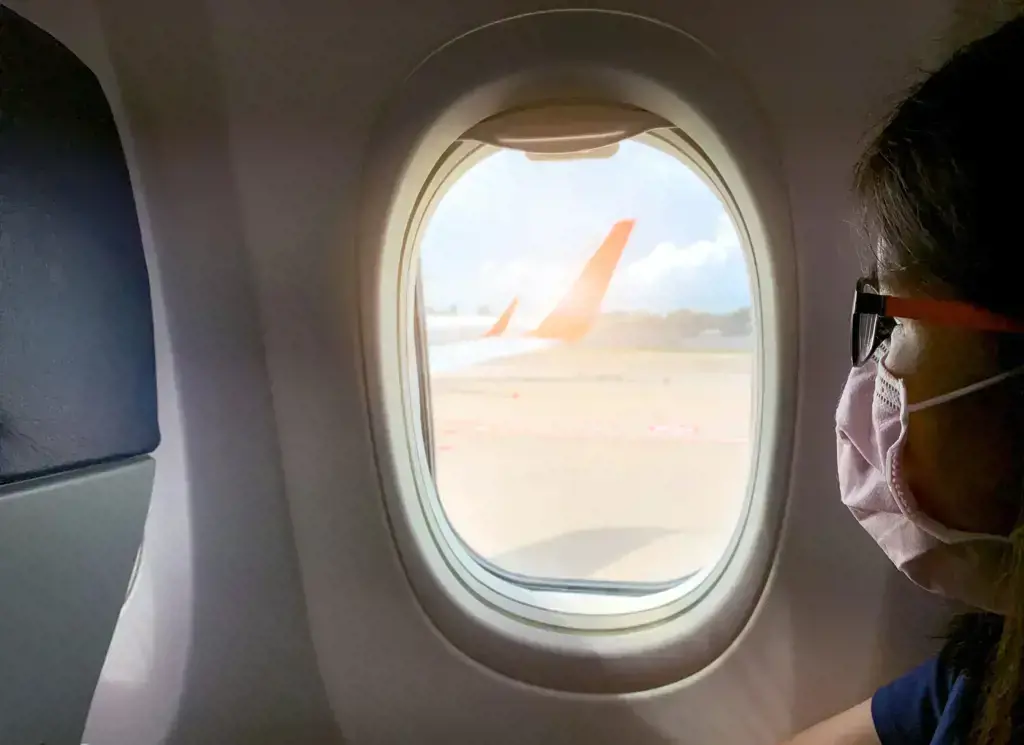
Yes, there are exceptions and exemptions to travel restrictions for certain categories of travelers. While many countries have implemented travel restrictions to mitigate the spread of COVID-19, certain individuals may be allowed to travel for essential reasons or due to their specific circumstances.
Here are some common categories of travelers who may be exempt from travel restrictions:
- Citizens and residents: Most countries allow their citizens and permanent residents to return, regardless of travel restrictions. These individuals may be subjected to quarantine or testing requirements upon arrival.
- Essential workers: Some countries exempt essential workers from travel restrictions. These include healthcare professionals, frontline workers, and other critical service providers. However, they may be required to provide documentation or proof of their essential work.
- Diplomats and government officials: Diplomats and government officials often have diplomatic immunity and may be exempt from travel restrictions. They are usually allowed to travel for official government business.
- Medical emergencies: In the case of a medical emergency, individuals may be allowed to travel to receive immediate medical attention. However, this often requires documentation from a medical professional supporting the necessity of travel.
- Family reunification: Some countries may allow travel for the purpose of family reunification. This could include individuals visiting immediate family members or joining their family in another country.
- Humanitarian reasons: Travel restrictions may be waived for individuals involved in humanitarian work or those traveling for urgent humanitarian reasons. This can include aid workers, volunteers, or those involved in international relief efforts.
It's important to note that the specific exemptions and exceptions may vary from country to country. Travelers should check the official government websites or contact the respective authorities for the most up-to-date information regarding travel restrictions and exemptions.
Even if there are exemptions in place, travelers may still be subjected to additional requirements such as quarantine, testing, or health checks. It is crucial for travelers to understand and comply with these requirements to ensure a smooth and safe journey.
Overall, while travel restrictions are in place to protect public health, certain categories of travelers may be exempt due to the essential nature of their travel or specific circumstances. However, it is important for all travelers to stay informed, follow the guidelines, and prioritize public health and safety.
Exploring Austria: Travel Restrictions for Canadians
You may want to see also


